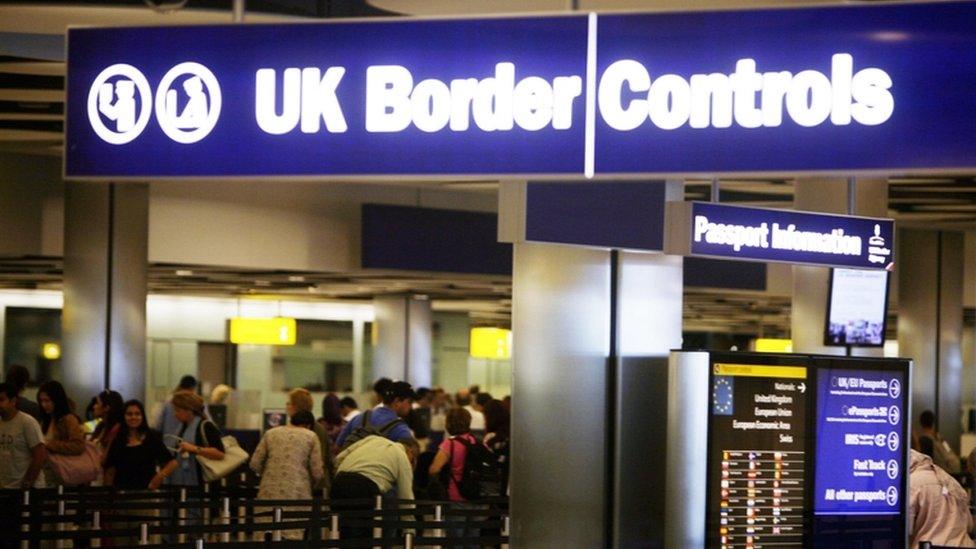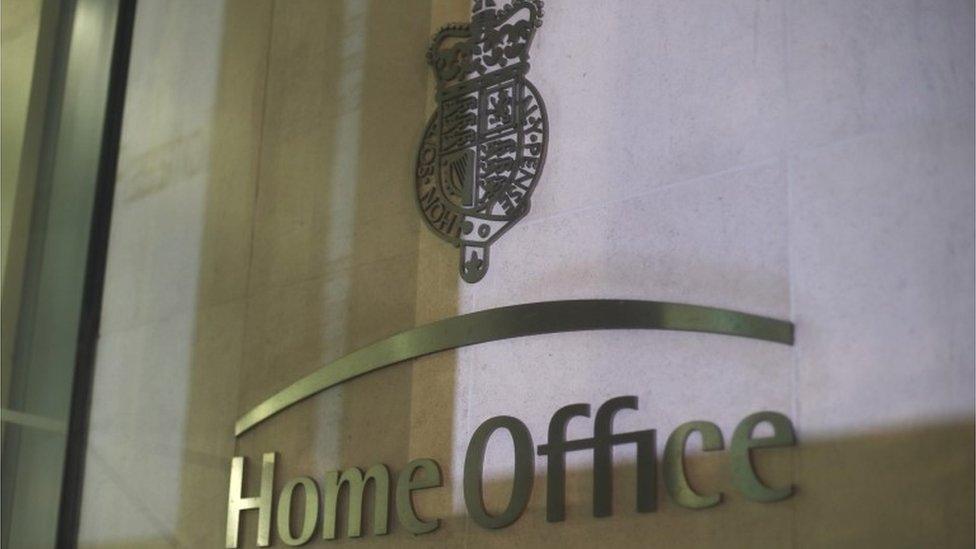Britain's work permits force hard labour
- Published

The Windrush generation has brought attention to the way Britain's immigration system works, and even more so to the way it doesn't.
The term "hostile environment" has stuck to Theresa May's government. And the anti-immigrant mood has swung to sympathy for those who came to Britain to make their future and help rebuild the country, but who have been treated harshly and unfairly.
For non-Europeans who want to join us in Britain, getting a visa is an expensive obstacle course. And for companies that rely on recruiting non-Europeans, that brings a significant cost - one that is borne also by the wider economy.
I've been taking a look at how it works.
If you've got at least £2m to invest in UK government bonds or in a legitimate British business, the system becomes much easier.
There's a visa for entrepreneurs, and another for short-term cultural visitors, from rock stars to Edinburgh Fringe performers.
Formidable
But for most people with skills which they want to deploy in the British labour market, they have to compete to win a bit of a lottery, to secure a place within the monthly quota.
Until recently, I'm told that quota wasn't much of an issue. It was rarely filled. But there's a lot more pressure of applications, perhaps because employers want to bring people from outside Europe because EU citizens are leaving Britain.
When you apply, you'll face a formidable amount of paperwork. For permanent residency, the form is 86 pages long. It's not so daunting for a temporary work visa.
But like a game show, you have to win points. They mean a better chance of getting a visa, if you're well educated and qualified, if you do a job for which there's a shortage of skills in Britain, or if you speak fluent English, that's an important help.

You also need to find a job in Britain, with a sponsoring employer who has to be licensed. The employer needs to prove that there's no-one already in Britain who is being displaced by you getting the job.
That means advertising the job for at least 28 days, and the advertisement has to conform to strict rules. If you don't stick to the rules, and handle the paperwork properly, you can be sent back to the start of the process.
One thing that has to be in the advertisement is the salary for the job you intend to take on. It has to be at least £30,000. And because of the number of applications, experts in this say that the effective minimum salary has risen sharply to the £50,000-£60,000 range.
So while that might allow in a doctor, it's not going to catch many of the nurses we need.
What are the costs?
We've seen some big increases in cost. In 2015, there was a health surcharge of £200 per person per year. If you've got a partner and three children, that's £1,000 a year.
And that's in addition to paying tax on your earnings in Britain, to fund the health service. The Conservative manifesto last year said they wanted to treble that figure.

From a year ago, there was an Immigration Skills Charge introduced for each visa application, of £1,000. The Tory manifesto said that should be doubled. No sign of that happening, yet.
When you put the fees together, one specialist lawyer from the Fragomen law firm in London, Ian Robinson, told me that a family of two adults and three children can expect £16,000 in fees for a five-year visa.
We've got big recruitment problems in the NHS and elsewhere - do we make it any easier for those with medical skills?
There are certain jobs where you'll find it easier to get work in Britain. There's a list which is occasionally updated, which sets out the jobs for which neither the UK or the European Union jobs market is providing sufficient numbers for the needs of our economy and public services.
Quite a few of those on the list are health occupations, including all types of nurse and paramedic. They're specific about the medical specialisms that are wanted and the level of experience.
If you're a managing director in the nuclear industry, you get a special mention. Quite a lot of engineering roles in the oil and gas industry are in there. It clearly lobbies to get on this list, as does electricity distribution.
In the car industry, we're short of product design engineers; those with experience and a leadership role in computer animation for films and video games; teachers of science and Mandarin; social workers; ballet dancers; orchestral musicians; chefs.

Not any chef, mind you. The Home Office wants high-end chefs but not mere caterers.
So in trying to recruit a chef from Bangladesh, a restaurant owner cannot be selling takeaway meals or fast food, because that's seen as cheap food, and less skilled cookery. One of my favourite eateries in Glasgow was recently contemplating giving up takeaways, and therefore shrinking the business, in order to make it possible to recruit a chef.
Darren Stevenson, a specialist at McGill Solicitors in Glasgow, says he tries to discourage restaurateurs from using his services, because the system is so difficult for them to get through, and he despairs of how often the rules change.
What special allowances are made for Scotland, if any?
The same law applies in Scotland and the rest of the UK, and there are very few differences in how it operates. One variance is the shortage list for Scotland, which includes all the occupations for the rest of the UK, plus a small number of medical jobs: oncology consultants, anaesthetists, paediatricians and psychiatrists.
Of course, there's a case for the Scottish government being able to issue work permits. It's gained some traction beyond those whose every call is for more powers to come to Holyrood.
It would require that a work permit specifies someone can only take a job in Scotland.
The employer already has to check the work permit carefully, so it's not asking much to get them to check that element too. Such checks are also required for starting a tenancy and opening a bank account.
If you're a business wanting to recruit from outside the European Union, how do you go about it?
This is the other important part of the system. It's awkward and expensive to apply. But there are also methods used to discourage employers from looking overseas.
First of all, they need to be licensed, which requires them to show they have processes in place to keep tabs on a non-EU employee. That licence costs £1,500 and has to be renewed every five years.
The employer has to go through this Resident Labour Market Test, of advertising a job very precisely. If you get an application from someone who is unsuitable, you have to show why, and keep a paper trail long after recruiting, in case the Home office carries out an audit.
Having advertised, there's another fee of £1,000 per year per foreign employee, which is seen as a way of paying the government to improve training, so that we don't have so many labour shortages in future.
The argument for an expensive or obstructive regime is that the government wants to make sure that people who already live here get the best chance of getting jobs, and are at the front of the queue.
But it's argued, for instance by the Campaign for Science and Engineering, with 47 big employing backers, that Britain is competing in a market for internationally mobile and sought-after talent.

That's particularly true of universities in recruiting staff. In Scotland, 17% of teaching staff are from the rest of the European Union, so they may soon lose the freedom of movement of employment they have enjoyed. A further 13% of teaching staff are from beyond the EU borders.
So universities have had to invest in teams of specialists to ensure they navigate the shallow shoals of Home Office rules. Likewise for students. And if their student recruitment falls foul of the Home Office, they can lose their licence to recruit, which would blow a huge hole in most university finance offices.
Meanwhile on the mainstream economy The Campaign for Science and Engineering also questions whether the immigration policy fits with the new industrial strategy, because if employers cannot attract talent from around the world, it holds back Britain's economic growth and productivity.
What happens when European Union citizens, after Brexit, have to apply for visas if they want to work in Britain?
For those already here, there is supposed to be a system for allowing them "settled status". But for those who want to come to Britain in future, we don't know. It's far from clear what the government wants, except that it interprets the Brexit result as a vote to cut back on immigration. So it's unlikely to get significantly more welcoming.
The concern from a number of lobby groups, including immigration lawyers and employers with a lot of cross-border traffic in recruitment, is that they'll extend the non-European visa system to Europeans. And for those in less skilled jobs, in agricultural work and food processing, for instance, they won't get many of the points needed to compete with medics on high pay.
The lawyers I spoke to were looking for less red tape, lower costs, better use of technology, faster turnaround.
At McGill Solicitors, Darren Stevenson says he gets a lot of queries from EU nationals about what the future holds for them. The system is designed for free flow of workers within Europe, but outside the EU, he describes the system as "a draconian nasty mess".
He welcomes the Windrush controversy, not because of its impact on individuals but because at least it sheds light on what has been going on.
- Published4 May 2018

- Published3 May 2018
